NJW&C 22: Comics Medium Raw

Hey, Kids! It’s Nice Jewish Words & Comics!, the latest installment from Neil Kleid's monthly newsletter with updates and info about his latest projects!
Two months later, I’m still mainlining Bourdain.
I do that sometimes. I obsess about an author or book series or a movie, TV show or style of food—it tends to mystify the wife, who nevers understands how I can re-read the same books over and over, or watch the same films. But it soothes me; like spending time with an old, familiar friend. Comfort food for my literary soul. And right now, to be frank, Tony’s writing is just that to me, both soothing and inspiring me as a writer, a foodie and a comic book author at this particular moment in time.

The specific book is Medium Raw, a collection of bits and bobs, a melange of critique and commiseration, all of it intelligent, wry, poetic, divisive and of course, angry.
Most of it is Bourdain throwing thunder at folks he hates, handing flowers to those he admires, intermingled with the usual well-written descriptions of plates and places I’ve come to enjoy from his work. I am considering giving his books a rest, however, because not only do they make me feel like a much inferior writer, but I am constantly hungry as I read. But read I do, because not only does Tony’s love for Vietnam have me researching how to make my own DIY beef broth for a homemade bowl of kosher pho (yes; I bought all of the ingredients to roast bones and simmer the broth)…but his prose, that salty-yet-satisfying mixture of both righteous anger and a love for food which borders on lust, inspires more than just my interest in cooking and food, but also my love of something else that Tony enjoyed, making comic books.
Right in the heart of Medium Raw, there’s a chapter entitled “Lust”, in which Bourdain goes into hyper-descriptive overdrive, jumping back and forth between kitchens and restaurants around the world, from simple roadside stands to third-world markets to beachside bars, using his gift for presenting overtly-sensual, compelling prose to set atmosphere and scenes…watering a reader’s mouths simply by using vivid and lurid descriptions about the food he’s eating, the things he’s experiencing, in a specific time and place, conveying smell, taste, nostalgia and yearning through nothing more than words on a page.
That’s one hell of a gift, I tell you. It’s powerful and inspiring. It worked on me. It always does, every time.
Not only did that chapter get me out the door, stalking local markets to find the right ingredients to create some of the dishes Tony described, to have the things he had that I have not, but it also got me thinking about how much he loved food and how much he enjoyed sharing the things he loved with the world, his readers, friends and family.
Sometimes, that’s hard to do when you’re struggling with the thing you love.

Look, it’s a pretty rough time for comic book creators right now, and comics in general. Between Diamond filing for bankruptcy to incoming tariffs affecting all aspects of the publishing industry, comic book publishers large and small are being more selective about who or what they publish…and that trickles down, making it harder for guys like me to get a foot in the door or sell a pitch. Even down at the small press / indie publishing / crowdfunding level, there could be a lot less of the same five hundred bucks going around a room (that’s an old comics convention joke, friends.) The belt tightening has begun; I can tell you that no matter who you are in comics right now, there’s a lot of The Fear and ambiguity and worry hitting every single level (which seems to be a common theme outside of comic books as well, on a global scale, but that’s not what this month’s newsletter is about.)
Because of that, I’m trying my best to cling to the things about both making and reading comics that continue to make me happy—to be able to look past all The Fear and ambiguity, and to remember why I love comics, why I love making them, and why sharing them with fans, friends and family continue to bring me joy.
Tony’s chapter in Medium Raw, the glimpses at the sounds, smells and tastes he loved, experienced and cherished—the “lust” he had for a bowl of Saigon pho, or a dense pastrami sandwich and pickle with a cold Dr. Brown’s on New York’s Lower East Side—had me thinking about the sensory comforts I’ve experienced and loved throughout my comics career, and have tried describing to others. (Look, I could have been inspired by Bourdain’s chapter titled “Heroes and Villains”, perhaps more apropos for a newsletter about comic books, and either elevated—Joe Caramagna is a hero; Kelly Sue DeConnick is a hero; Walt Simonson, if you’ve ever had the chance to meet the guy, you know that he is a hero—or denigrated folks in our industry—the people behind Bleeding Cool are villains; anyone who pirates comic books are villains; any artist or publisher using AI in their comic book is a villain. Instead, I chose to be happy and leaned toward “Lust.”)
I’m not Anthony Bourdain, by any stretch of the imagination. I’m definitely not as well-traveled or as talented, intelligent or gifted as he was. But perhaps some of my below written experiences—especially if you’re a comic book creator struggling to find your place in comics right now—may help you recapture that love and inspiration, as well. True, I didn’t lean solely on prose below–there are a handful of images. Mostly, though, it’s a bit of scrolling text. So if you’re here for good art, keep on scrolling until you get down to the bit about LA Strong.
Bon appetit.
****
Parked behind a six-foot table at the Rosemont Convention Center in Chicago, watching the flow of traffic meander through the Artist’s Alley in the back of the cavernous space. Dan Taylor hawks his Hero Happy Hour books, standing to my right, arms folded in a white tee and surveying the scene. It’s about three on Friday afternoon, and it’s a bit slow.
The smell of popcorn wafts through the Alley—not yet the buttery, acrid scent that will overwhelm vendors by late on Saturday—squinting a bit, the mix of superhero tees, designer backpacks, glossy comic book covers and banners blends together in a blurry yet glorious pop of color you’ll really only find from a crowd like this or on a Sunday at Disney World.
Sighing, the simmering anxiety starts bubbling in my chest—like ginger ale, having been swallowed too fast; should I adjust the table set-up, maybe move the more commercial books to the front and the more literary-minded stories to the back? The flow of traffic makes its way past me now, a sea of eyes determined not to make contact with my own, looking down at book covers, scanning for compelling art or titles, doing their best not to connect with an actual human being.
Standing with determination, pushing a smile onto my drying lips—with a quick reminder to sprint to a popcorn stand and purchase the cheapest bottle of water I can find—I pick up one of my more well-known books and hand it across to a set of eyes, stopping them in their tracks. “Have you read ______?” I ask. And then with a flutter in my chest, speaking to a random stranger, my voice swells with knowing confidence as I launch into a pitch.
Other random strangers gather, drawn by the possibility of something new, something different, a comic or book they hadn’t read before. Dawning interest lights in some of the eyes, reaching their own drying lips, broadening out into welcome smiles. The pitch becomes a sale. Then another.
****
The box arrived early this afternoon, a printer’s label sealing it shut, but I waited until evening to open it, once the work is done and my family home.
It’s heavy; not too big, but requires effort to carry from the front door to the kitchen island. A quick text to my co-author—the books are here, the comps arrived—and I grab up a pair of scissors or a paring knife and carefully slice through the tape and seals, opening the cardboard flaps.
Light, crunchy styrofoam packing peanuts fall onto the island, a few more solid foam slabs holding the books in place. Another slow, careful slice to the tight, transparent shrink wrap…and then the smell of freshly printed books. Lifting one out, gently reflecting the kitchen light against the cover, I hand it to my wife, a child. Look here; a book is born. Hallelujah.
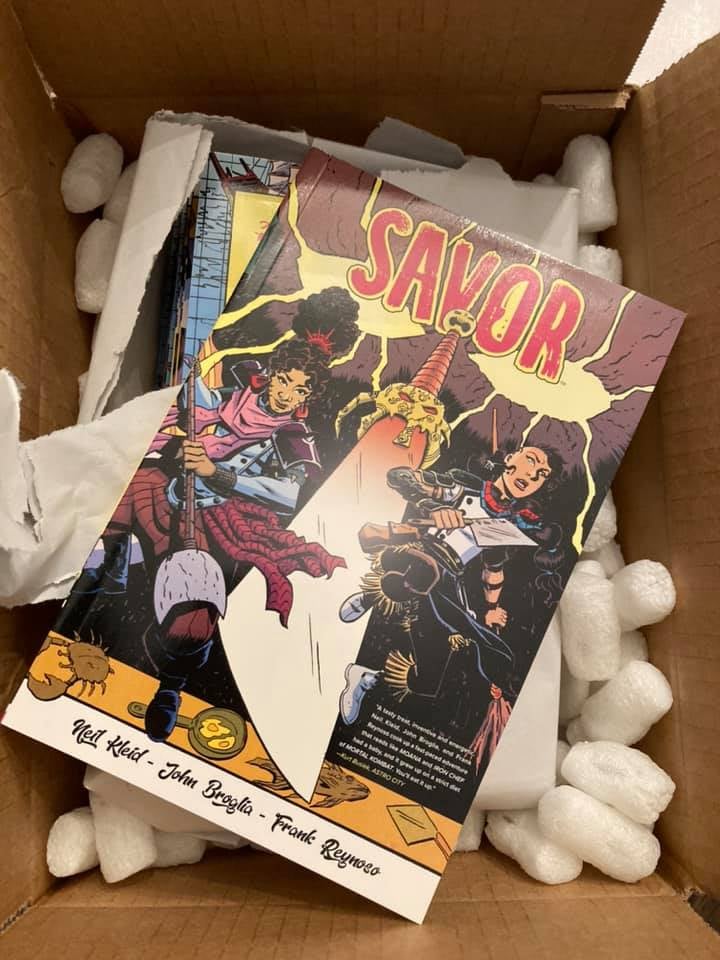
I remove one copy, and then another, stacking them on the table, arranging them for the inevitable photo to introduce the book on social media—behold, The New has arrived. My co-authors and I have spent a year, maybe several, bringing it into the world. Every new book is a goddamn miracle. Here it is now, in my hands, in the hands of another. Soon it will live on shelves for others to appreciate it, to lift it up and celebrate the New.
“Every new book is a goddamn miracle.”
Beaming, noticing how vivid the colors, watching the play of dust motes softly floating above the open flaps of the box from whence it came, I take a copy back from my wife, a child, and turn it in my fingers. A quick inspection of the cover, the back, and I open the front cover.
Smiling again, eyes shining, I turn the page.
****
11:27 PM on a Wednesday night, and everyone’s asleep.
Sitting at my kitchen table, lit by the dull green glow of a laptop, a bag of salty almonds and a bowl of plump, red strawberries by my side, fingers dancing upon the keys. Text scrolls on an expanse of electric white, the words on the screen a deep, almost true black—in the script, organized by pages and scenes, snippets of dialogue—constructing a world, panel by panel.
My cell phone pings; an email, something urgent demanding attention. Distracted, trying to focus on the scene in front of me, on a specific turn of phrase for this issue, I glance quickly and note that the message is from the issue’s co-author. Curious, I tap to open and discover three black-and-white pages of pencils, breathed to life from an earlier script.
I set aside the phone and navigate to my inbox on a web browser, a warm feeling spreading through my chest—pride? Anticipation? I download his pages to my MacBook, storing them in a pale blue folder marked “sketches” on my desktop, which I’d placed within a parent folder marked with the comic book’s name. Double-clicking, they spring to life, filling my screen with both illustrated examples of potential and kinetic energy. Faces I recognize; the face of a character I helped breathe to life with words, partnered with a co-parent who birthed it with lines and shading, and soon with color. Panel by panel, moment by moment, the story springs forward at me and I check the art against the script, against descriptions and dialogue I wrote months ago, inspecting it for flaws and finding none—like a nervous parent checking a newborn’s toes or fingers, to confirm that the correct number exists.
Restraining myself from posting the art online, I dash a response, a reply-all to the distributed team—“this looks awesome”—coupled with the right emoji or dancing, animated GIF. I look at the pages again, and then think about if or how any of it might enhance or affect the current issue that I’m writing, the script white and blinding and flecked with off-true black text, still open and waiting for me to lean back in, to feed the never-ending, hungry beast.
It won’t get better than this tonight, I think, and I opt to close the file, saving it before gently closing my laptop with a grin. I pop the art open on my phone again, admiring the page on my way up the stairs to shower, and possibly to sleep.
Ten minutes later, under the spray of water and a lather of soap, a new idea for the current issue—a way to make it better, how to strengthen a relationship or level up some action—jumps fully formed into my skull. It’s a feeling not unlike opening a door inside my mind, revealing a happy, barking puppy; a playful little thing that wants me to join it outside, toss the ball, go for a walk, have some fun, stretch my legs.
I quickly towel off and dress. Glancing at the clock, noting the lateness of the hour and calculating the necessary amount of asleep needed to function in the morning, I head downstairs to write for another forty-five minutes.
****
Saturday night in San Diego, rolling with three good friends and someone new, a writer I’ve never met but who fits right in, adapts to our familiar patter and keeps up with the references.
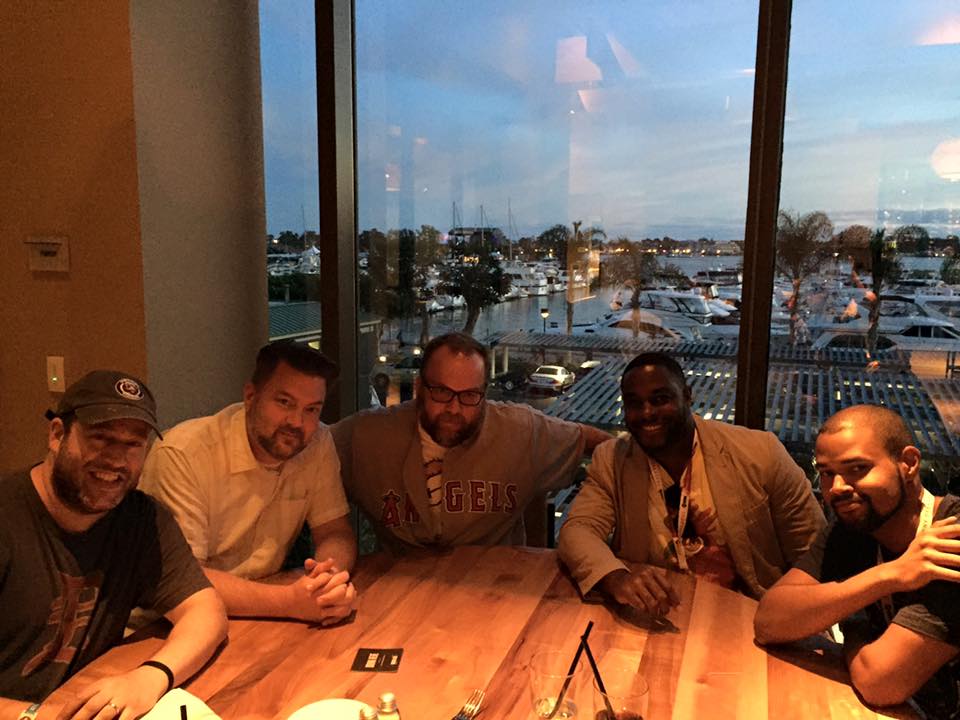
We’re out to dinner at the Marriott Marquis, catty-corner to the convention center and a gateway to the marina, after dark when the con is closed and every one is roaming the streets of the Gaslamp Quarter seeking food, booze and a shared experience they can’t get back home. Here in the Marriott, we’ve abandoned our tables and responsibilities, left behind the urgency and needs of the convention, and soon enough, we all have drinks in hand. Dan and I are drinking beer, condensation pooling around glasses or bottles, staining the table as we wait for our waiter to return and take the order; Kody’s sipping whiskey. Rob isn’t drinking right now, and Nick hasn’t decided.
The restaurant is packed—a mix of creators and colleagues from around the world, like us, catching each other up about work and family, the things we’re reading or watching, the things that we’re not. There are girlfriends and husbands, boyfriends and wives, some from the industry and several patiently listening as stories are told and deals are made. Business meetings are happening throughout the room, voices and pitches rising and falling with the music—a piano or a recording of one tinkling from somewhere in the dimly lit space. Friends and editors drift past our table, stop to say hello, shake a hand, pat a back, and we fall into conversation about the work, the life, the con—how did you do today? Did you make your table? Any good meetings? Did you see Stan Lee’s panel, Darwyn Cooke’s, Kelly Sue’s, Quesada’s or Matt’s? Did you read the new Eddie Campbell—how about that anthology, or that new, beautiful Peanuts reissue? I picked up a fantastic Sienkiewicz print and shook the great man’s hand. Hey, have you read my latest? Heard about the next thing? Have a great night. One more day. You guys enjoy yourselves tonight.
Dinner takes as long as it takes, and then the five of us drift downstairs to the Marriott pool—meeting with Tony, some others, who were at an industry party nearby. The tiki bar is closed, but the chairs are free and we lounge and chat like lazy kings, beers on the pavement, hands behind our heads, staring up and sharing stories beneath the stars. Crazy things that have happened this year, industry gossip, books we’d like to write, books we plan to right, deals we all might make. Rob and I perch on the edges of our lounge chairs; he’s just had a kid, and I have two, so we commiserate about children, expectations, fatherhood, and the future—things a bit more important and universal than putting pictures into boxes, than telling stories. The conversation twists and turns throughout the night, back in on itself, the hour growing later and later. Colleagues, friends—people I love and see maybe once a year, if that, and even less over the following decade. We share a bond that can only be formed by those like us, who’ve been raised up and beaten down by The Industry, by predatory publishers and terrible rates, by the needs and ambitions of a Career In Comics. We share the same experiences, the same goals, the same heartbreaks and triumphs—who have dealt with last minute pitches, and navigated terrible offers. Had the odd success, and suffered the same blows. Some of us came up together, others met along the way. But here we are. Here in Comics. Sitting at the annual summit and telling stories by a pool beneath the stars.
Here in San Diego, right next door to the bumping, vibrating, humming Hyatt hotel, where the industry drinks and networks at the bar throughout the night, into the dawn, trading stories too, getting into trouble, reacquainting with one another, shaking hands, making toasts, meeting the rookies and hugging old friends. Next door, lounging on a pool chair, listening to the sounds of the city and the nearby marina, the laughter of my friends and colleagues. Here I sit with friends I’ll have for life, even if our lives and careers drift apart—because of distance, momentum, changes in the culture. These are friendships which mean the world to me, forged through comics, but maintained through trust and hope, a global posse that would be there to help at a moment’s notice—with a kind word, a discerning eye, an introduction or a bit of encouragement—as I would, and have been, and always will, for them.
****
Friday night, the mid-1980s, suburban Detroit. Our old house on Kenosha, before it was razed to make room for a highway.
Shabbos is closing in fast. My brother and I are stretched out on the floor, playing with toys, watching teevee; something, anything other than helping Mom get ready for sunset.
Exhausted, Dad comes through the door, the screen door creaking back, slamming against the door jamb. The sun is starting to set, fuzzy and diffuse through the curtains, speckling a black-cushioned chaise with pinpoints of light. We’ve got dozens of Kenner Star Wars action figures laid out on the living room floor, a nostalgic plastic mess, tiny blue and black weapons and accessories in a nearby pile. A few superheroes are mixed into the lot—Super Powers, Secret Wars, whatever; we call it “a picking game.” You pick a figure, then me. Then you. And so on, until they’re all claimed and then we have teams.
Dad looks tired, a long day at the steel factory. He lurches into the living room, holds out a brown paper bag, having carried it in from our brown-and-yellow striped station wagon. The bag crinkles in his hand, weighted with a stack of nine or ten comic books plucked from the metal-wire spinner racks in the corner of Little Professor’s Bookshop, a local store Dad stops at Fridays on his way home from work. Gently, he tosses the bag into the living room, letting it plunk with purpose onto the floor; no words are required. Here you go, read this and just let me rest.
The comics are hungrily, greedily slid out of the bag and onto the floor. Divided, divvied up by publisher, character, agreed upon. You read these ones; I’ll read those. Then we’ll swap. There are Team-Ups and team-ups, presented respectively by Marvel Comics and DC. Teen Titans, Fantastic Four, and funny animals. Cap. Spidey. A handful of Avengers and Justice Leagues, Perhaps a Richie Rich, an Archie, a Hot Stuff or two.
We spread out on the floor, propped up on our elbows, just as the sun goes down and Mom lights the Shabbos candles, a soft glow replacing the sunset, brightening the living room table and warming our hearts. The week is over. We are loved by parents, in a warm and welcome home. Food is on the table. Shabbos is here.
And we have new comics.
****
Ed Brubaker is at this party, but I haven’t got the balls to say hello.
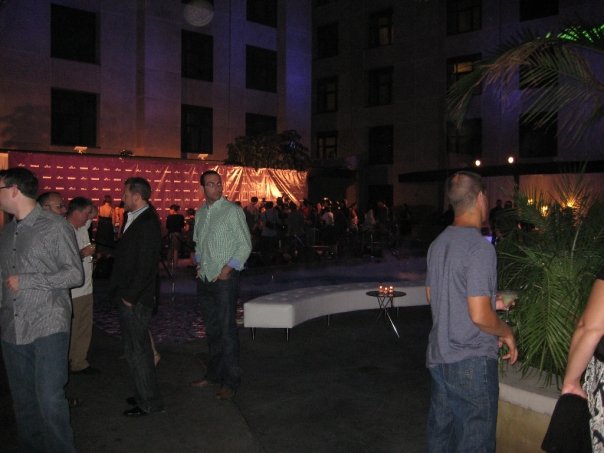
It’s my first time in San Diego, my first Saturday night at Comic-Con, and somehow I’m standing on the roof, my back to Firefly’s Nathan Fillion. The magazine’s logo—the one hosting this party, an open-air venue awash in red, purple and yellow gels, white VIP tents dotting the poolside area and three bars artfully placed in strategic points around the roof—the logo, it’s shining against the opposite building like the goddamn Bat-Signal.
It’s a Hollywood Comic-Con party, and I have no idea how I was able to get inside. Well, that’s not true; my pal Marc snuck me in, got me an invite, and boy do I appreciate the gesture. There are no fewer than three stars of NBC’s ‘The Office’ standing around, drinking wine, and the list of guests are a mixture of publicists, glamorous entertainment types, tier-two celebrities and hangers-on. And there are the comics people, drinking in the corner, lookie-loos trying not to be noticed just yet.
How did I get here again? I’ve got a new graphic novel out from a small press publisher, and while I’ve managed to score a few high-profile projects, some of which will die on the vine in a few short months, I’m basically a nobody. One of my books has garnered some interest from producers, with options, and half my weekend has been spent in hotel lobbies or at coffee shops speaking with associate producers from every studio in town. Now here I am, dressed to party and chatting with Damon Lindelof, high-fiving Marvel editor-in-chief Joe Quesada, sipping whiskey and gnawing on a carrot.
I don’t belong yet, at least not the way I’m feeling. But maybe one day I could. Maybe soon. With the right project, the right connections. Every handshake is not only a thrill, but an opportunity. Restraining myself, playing it cool; it’s more difficult than you think.
Suddenly, one of the Top Shelf guys appears. Finally; indie comics. Something I know from back home, back where I’m comfortable, at the Small Press Expo or at the MoCCA Fest in New York. People with whom I’m familiar, from the life I know—not here in Hollywood. Not here on the roof, where I think a band is about to play. I chat a bit with the Top Shelf guy, and then moments later he’s flirting with a nearby publicist, leaving me to my own devices. We’re all going Hollywood by way of San Diego, I suppose.
Should I say hello to Ed Brubaker? Probably not.
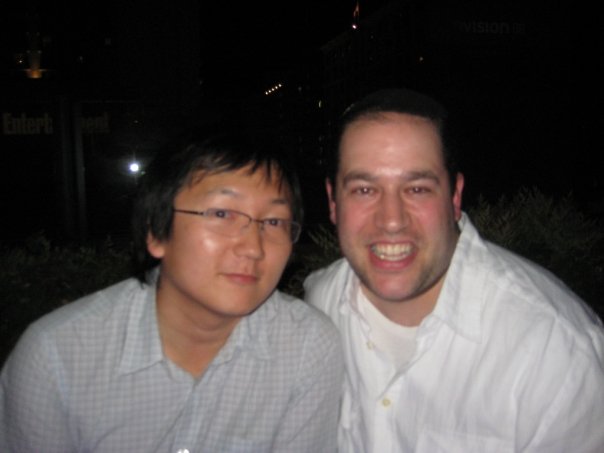
Talking to celebrities is no big deal—in fact, I just cornered Masi Oka from NBC’s Heroes, and asked him to say hello to my pregnant wife back in New York. It’s 2 a.m there, and she’s staying at her parents in Staten Island; her mother wakes her up. She trades pleasantries with Masi, and I thank him for his time. But still, I can’t bring myself to go over and introduce myself to Ed, whose books I revere, whose work I adore. The butterflies are swimming in my stomach—impostor syndrome, or maybe that last glass of scotch? I teeter near the pool. Best not to fall in. Instead, I locate Marc and our other friend Adam. We decide it’s time to go. We’ve spent enough time in Hollywood, above Comics, here with the beautiful people, where indie comic book writers were never—at least maybe not yet–meant to go.
Marc offers a casual hello to Brubaker on our way out the door. I stammer something and dart for the elevator. I don’t belong here. Time to head back down to Earth.
Maybe I’ll try talking to him again tomorrow.
****
I’m hunched in a comfortable leather chair, sitting across from Clark Kent, hands drumming against my knees. The receptionist is taking calls nearby, softly responding to each one in carefully measured tones. Otherwise, the room is hushed and silent.

Moments ago, I scrawled my name on the visitor’s log, glancing down the list for familiar names. I’m on the Superman floor now, but she soon sends me to another—to Gotham City, a second reception area decorated in black and purple with yellow highlights, memorabilia and murals accentuating the space—the Batman floor. I carry a leather portfolio, and the handle is cold and plastic in my hand, gripped tightly. I’m not wearing a suit, but I did dry-clean a dress shirt and pulled on a tie. It’s stifling me; I feel like I’m choking. But I can’t stop smiling.
Five minutes later, Jordan bustles out and ushers me back to his office.
Marching down the hall, past framed artwork and a series of closed doors with colorful name plates and familiar logos—lightning bolts and magic rings; the helmet of Nabu. It’s a place buzzing with restrained activity, harried looking men and women rubbing their chains and inspecting cover art and panels pinned up on cork boards, the sun streaming in through the windows facing out and down onto Broadway. In a moment from now, I will crane my neck to look down from Jordan’s window, onto the street from above where I can see the Ed Sullivan Theatre, the home of David Letterman.
There are a few introductions. Some editors that Jordan thinks I should meet. I get to see some cover designs for books that will hit stores around the country, maybe even the world, in six months’ time. I’m polite, and appreciative. I thank everyone for their time, and I tell them how much I enjoy their books. My hands aren’t clammy. I belong here. I can do this work, and am ready to seize the opportunity. Yes, hello. I’m a comic book artist. Give me a chance.
We finally reach Jordan’s office. “Okay,” he says, genuinely happy that I’m here, and indicates a chair. “Let’s see what you’ve got.”
Nodding, I place the portfolio on my lap and quickly slide back the metal zipper. It opens with a rasp. I take out a handful of pre-fabricated art boards and place them on his desk, turning them around as I do. Some of them are original stories, but most of them are recreations of famous comic books I’ve known and loved—old Showcases, an Avengers or two. Jordan bends his head, pulls the pages closer. As he does, the sun flashes through the window, blinding me for a moment. I can’t see his face, but I can see his smile.
“Here we go.”
****
Looking out onto a sea of comic book fans. My navy Detroit Tigers baseball cap is set down on the table in front of me, placed right next to the mic. I glance over to my left, up at the screen. There’s my name, and art from my comic book, facing the audience, rotating with slides featuring other comics, other names and faces sitting up here on the dais with me.

Scott’s to my left. Mark’s on my right. The two of us just managed to catch up before we mounted the stage, trooped up here one by one and took our seats. There are about eight of us up here in total. Somebody’s missing, I think. But that’s okay—we’ve got a few minutes. The room is buzzing slightly with conversation before the panel begins.
It isn’t my first. It won’t be my last.
Will the audience care about anything I have to say? I worry that, because I’m not a “name”, or there are others up here that are, I won’t get a chance to speak. I don’t want to speak the entire time, though; no one wants to be that guy. Will I be able to clearly explain what the book is about? Because it’s got Jewish themes, and some of the art depicts Jewish and Israeli symbols, what might they ask, and will I be prepared to answer?
I’m fiddling with my mic, whispering something to Mark, trying to do my best not to let the speakers pick up what we’re chatting about. As always, I’m waiting and conflicted: do I belong here? Of course I do. But maybe not as much as others. Will anyone think I’m a fraud? Will they hate the comic, or worse, hate me?
What if nobody asks me a question?
The room, the seats are filling in. The conversation lessens from a buzz to a whisper. The moderator joins us onstage—he was the one who was running late.
I take a breath, and twist the cap off my complimentary bottle of water. My name is printed on a placard in front of me. I turn it around, so the audience can see who I am, if they can even read it from this distance. I turn my Tigers cap around too, so they can see where I’m from. Usually, I wear a Detroit baseball cap on my head—like a trademark, and I’ve even been depicted this way by other comic book artists—but I took it off to reveal my kippah, to remind everyone that I’m an Orthodox Jew. I crane my neck, glancing at the moderator, down the murderer’s row of creators sitting next to me on the dais. There’s not a familiar face in the audience, except for the publicists and publisher. The moderator taps his microphone, leans in to say hello.
And then the panel begins.
****
Saturday night again in New York City. My wife is sitting next to me, joining me for the first tie in a while at an industry event. The auditorium is packed with folks I know, creators whose work I have long admired, several whom I’ve met tonight.
Most, if not all of us, are Jews. I feel quite at home.
There’s a speech sagging the interior pocket of my sports coat; I wrote it last week. I want to say something to my wife—it’s literally been filling me up with anticipation and excitement I’ve been carrying for weeks, ever since I opened that email. She doesn’t know, but I do. One of my boys does too, waiting for us back at home—he kept the secret, which surprised me—and a handful of folks in the front row of the audience knows, as well.
We nominees settle in to our comfortable seats, moving down the pew of seats to make room for those behind us, snacking on h’ors d’oeuvres and sipping cocktails, making sure that there’s room for all at the front of the theatre. Up on stage, the logo for tonight’s awards ceremony beams down, projected from a screen against a dark blue background. There’s a podium facing us, and everyone in the room seems to be content, happy to be part of this crowd, whether or not they’ve been nominated, whether or not they’ve won, whether or not they’re even in comics or simply here to support the event, friends, or loved ones.
I’ve already won. I know I have, because they told me. It’s been difficult not to shout it from the rooftops, to be honest, to tell everyone I know.
But soon, minutes from now—maybe thirty—I’ll finally be able to reveal the truth. To my friends and my colleagues, to my patient and loving wife—deceiving her, keeping this a secret has been one of the most difficult decisions I’ve ever had to make. Truthfully, it’s very hard to surprise my wife. She knows things. She’s smarter than me. But this time, I allow myself a moment to feel malicious happiness. I finally know something that my wife doesn’t. I know that I’m about to be announced as Writer of the Year.
The ceremony begins, and the awards are handed out, one by one, presented from the wooden podium facing us from the stage. Speeches are made, and videos are shown. I can’t stop fidgeting, and instead finish my drink, setting the glass down on the floor, beneath my seat so I don’t accidentally kick or shatter it on my way to the stage.
Two of my books were nominated for different awards, in different categories. Neither of them won; I know that. She doesn’t. Each time I lose, I catch her looking at me from the corner of my eye. She’s getting worried. I can sense that she’s wondering what to do if I lose them all. She rests her hand on mine, warm and comforting, smiling and listening. Waiting for the last award.
My body tingles with anticipation; I know that it’s coming. I’m trying to contain a laugh, halt tears of joy from spilling down my cheeks.
Finally, everyone knows. Now she knows. I lean over to kiss her on the cheek as I rise to my feet, headed for the stage. She asks, “did you know?” I smile and nod. “Got you.” I feel light, gleeful.
The speech is a blur—literally; the toner or ink in my printer must have been empty, and I can barely make out the words on the page. I stumble over it, hesitating as I try to decipher the elegant speech I’ve written. Everyone thinks I’m choked up; I’m not. I should have checked before leaving the house. I thank my wife. She looks beautiful, beaming from the audience. I thank G-d, my parents, my co-authors. Applause and laughter wash over me, and I look out at my peers, at my tribe—Jewish comic book creators, people I admire and cherish—clapping in the darkness. I can barely see them, because the spotlight is shining in my eyes.
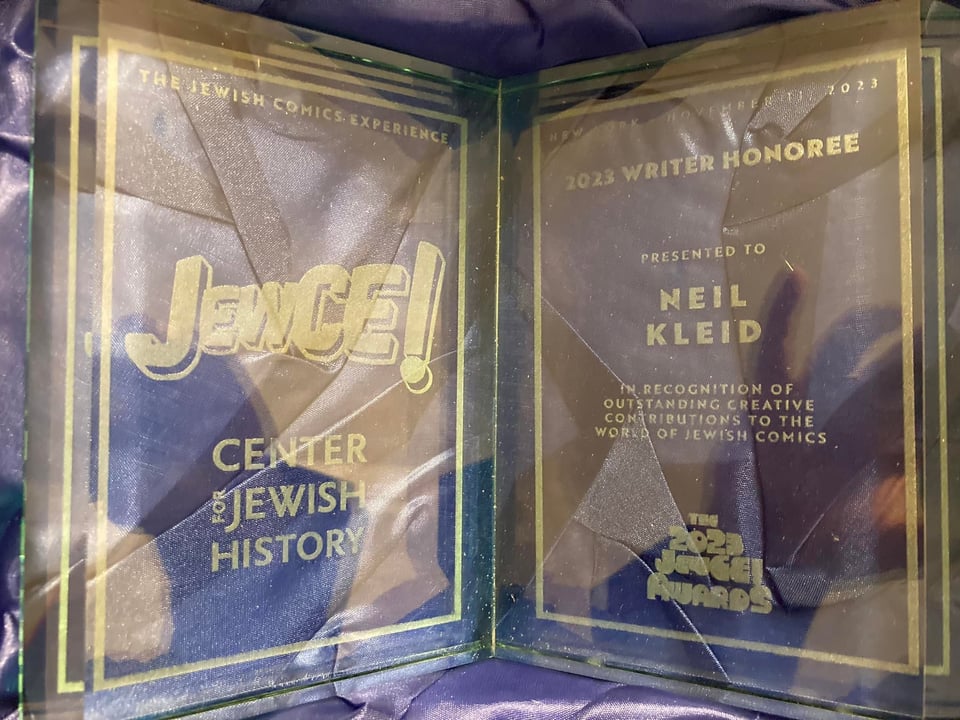
The award is etched in clear lucite, heavy and transparent. It rests inside a velvet box, the fabric feeling luxurious to touch. Back in my seat, my wife’s arm happily draped through my own, I trace my own name in the lucite. It feels comfortable in my lap, like it belongs.
****
New York Comic-Con, one more Sunday. A kid is sitting at my table, dressed as Wolverine—the yellow and blue costume, not the brown and tan—chunky muscles overwhelming his little body. He’s drawing on a notepad, sketching cartoons. He’s surrounded by books, stacks of graphic novels and anthologies, one of them containing a story I wrote.
The kid’s hair is brown and curly, highlighted blonde. He seems at ease; like he belongs. I suppress the urge to tousle the budding young cartoonist’s hair, to give him a hug. I don’t want to embarrass him here, in front of his peers. So I simply watch and wait, smiling to myself as I sign the odd book to sporadic passersby.
Finally, the kid looks up, drops his pencil, glances out onto the convention floor. It’s loud; video game soundtracks compete with the roar of the crowd, the movie trailers playing on monitors in nearby booths. From where we are, close enough to the Marvel booth but far enough to still be heard, he can see kids his age playing with Legos, or browsing for toys.
Owen’s eyes meet mine. I stop trying to resist and run my fingers through his hair.
“Hey, buddy,” I ask my son. “You about ready to shop?”

Gratefully, my son abandons his post—done working for the day—and follows me out of the booth as I say my goodbyes to my co-authors, to the editors and publishers, promising to catch up with them after the convention is finished, when the selling and loading and promoting have settled down, and New York Comic-Con is in the rearview mirror.
Taking Owen’s hand, I head out into the flow of traffic, gently steering him around the photo circles, the snags in the aisle, toward the far end of the floor where we might find some Legos, comics, and toys.
Twenty minutes later, he refuses to take a picture with another Wolverine, this one in a torn, white tee, bearing long, sharp metal claws. Instead, Owen shyly asks a nearby Batman if the Caped Crusader wouldn’t mind a selfie. The Dark Knight agrees, kneeling down to pose with this little chunky Wolverine who’s abandoned his costume for a Green Lantern shirt. Inexplicably, Batman’s friend joins the photo, dressed as Captain Cold. Their costumes are impeccable, and expertly tailored. Owen smiles at me, into my camera, all happy grin and brown curls and excited light reflected in his eyes.
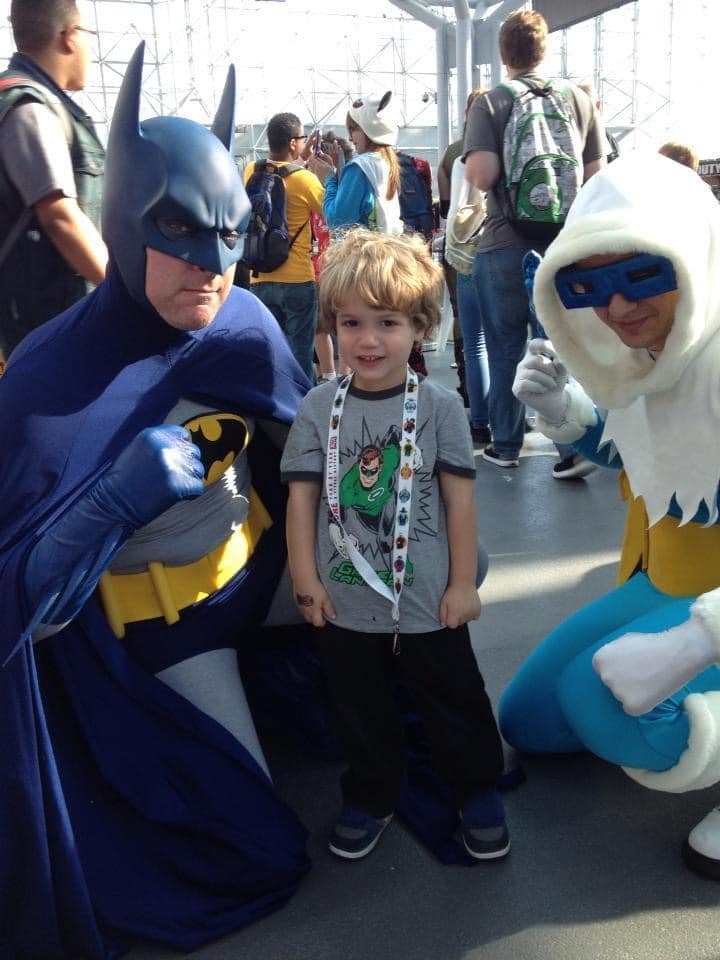
Taking his hand, thanking the cosplayers, I lead him down another aisle, getting lost with my son in comics and pop culture, pointing out the road signs of my childhood, doing my best to let him find his own path along the way.
****
Sunday afternoon, Monsey, New York. Sitting in another kitchen bathed with light. My aunt and uncle’s kitchen, in fact, thin sheets of printer paper spread out on the table, resting next to a short stack of books.
Hours ago, I’d returned from Nanuet, a nearby town, and a cookie-cutter gray strip mall positioned halfway down Route 59. There, tucked behind a Children’s Palace toy store and a shop selling colorful fish, was a long narrow corridor of a shop. I spent thirty minutes this afternoon browsing at the Wizard of Comics and Cards.
The Shamus brothers weren’t there that day, but Pat was. He manned the counter, and was always nice to me, saying hello by name, and steering me toward the books I might like. Back home, in Detroit, the shops I frequented were less friendly, a little darker with an indifferent—often grumpy or hostile—staff. And those shops smelled terrible; rot beneath the pages, a funk, really, that never assaulted my nose at the Wizard. Here, I felt comfortable. I was half a country away from my parents, living at my aunt’s, spending my freshman year of high school in New York, and I had this wonderful place to which I could escape that felt like home.

The last time I’d been in the store, Pat had sold me copies of Crisis on Infinite Earths #8 and Secret Wars #8, pulling them down from the wall behind the cash register—the wall featuring all the very important issues. Both of them had come bagged and boarded—slipped carefully into a slippery, transparent mylar sleeve, and rested gently against stiff cardboard backing to protect the books and keep them in mint condition; no bends, no tears, no folds.
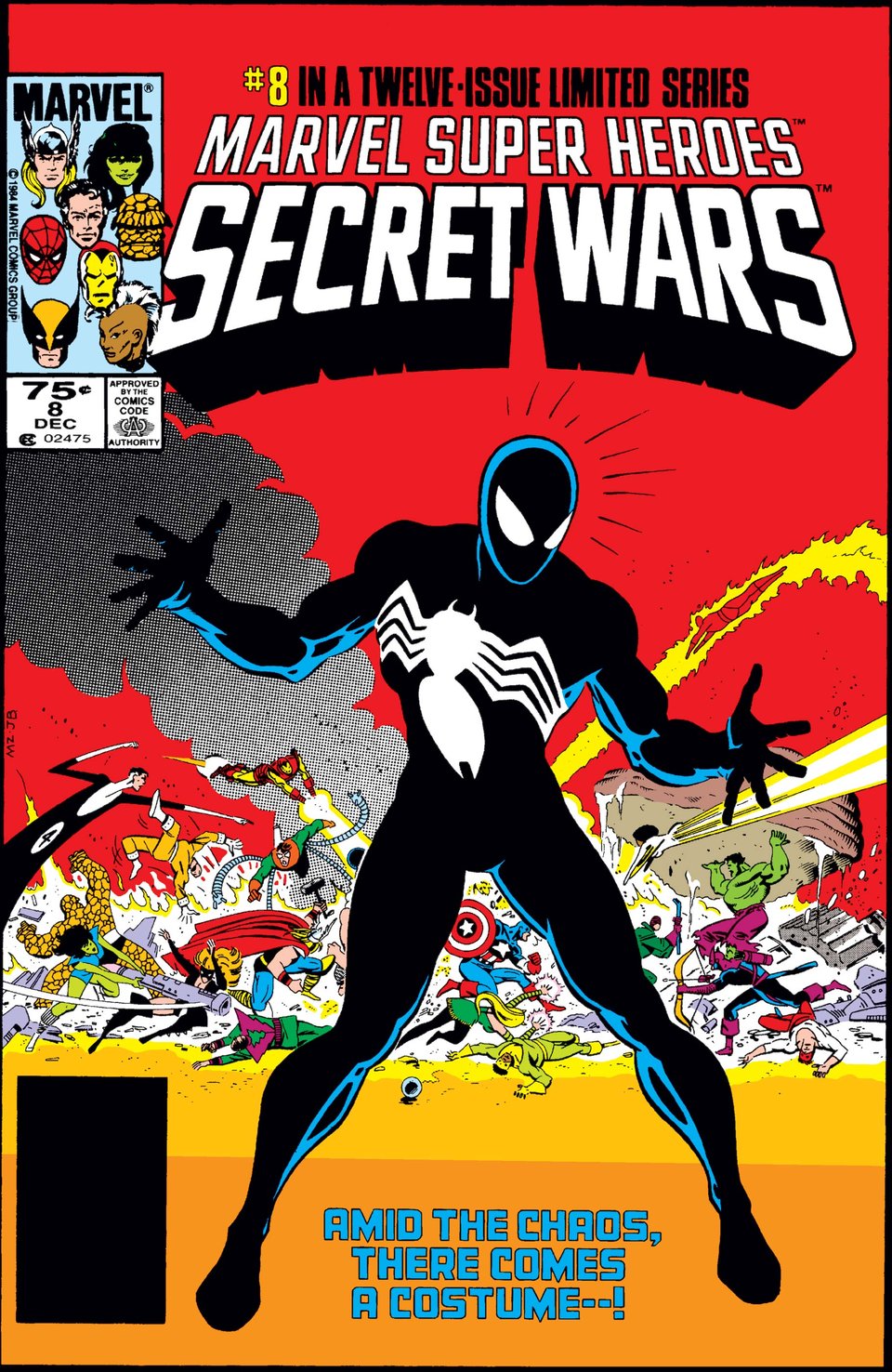
The former, Crisis, featured the death of the Silver Age Flash, while my copy of Secret Wars had introduced Spider-Man’s black costume, which was making something of a stir, Pat said, in the industry and also in stores around the country. Both issues, he said, would be worth something one day—the Wizard guys, Pat included, were big on figuring out a comic book’s valuation, on calculating, like a baseball card, how much a book might be worth one day to the right collector, depending on what happened within the pages. But I didn’t care. I enjoyed my comics for the characters and the stories, and also for the art. And on that lazy Sunday afternoon, after my aunt Anita drove me back to the house—where I was staying for the year, occupying the guest room—what I really cared about was the balance of the page, the number of panels and word balloons, the perspective of the art, the designs of the costumes and the shading that could turn a two-dimensional drawing into something…well, more solid. A drawing that could truly jump off the page and into the hands of the reader.
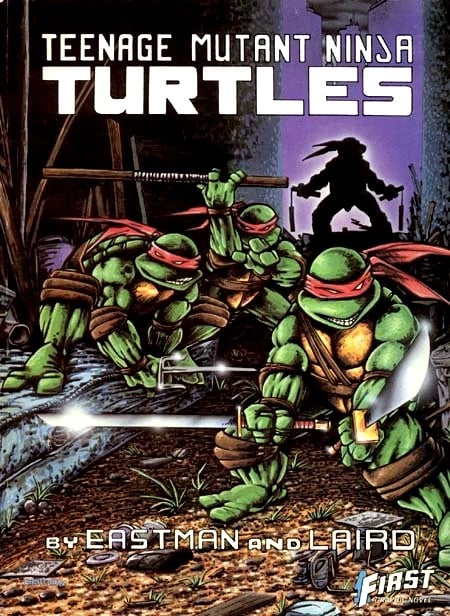
Earlier in the day, at Wizard, I bought my first-ever “graphic novel.” A collection, really, of a new group of characters I was starting to hear about—turtles who were ninjas, the art completely devoid of color—not realizing that years later, when I started making comics of my own, that one of the two creators would change my life. I pored over the pages and the characters, none of which felt as sterile or pretty as the art in recent issues of The Avengers, Captain America, or Justice League. Sitting at my aunt’s kitchen, having a snack, I put a sheet of paper over one particular pin-up drawing—a picture of Raphael, who carried a three-pronged dagger I learned was called a “sai.” I took up a pencil and started to trace the turtle drawing on the paper.
After several successful attempts, I laid my paper next to the open book, resting on the table, holding down the edges to keep it from curling away, and did my best to copy the drawing without tracing atop the page.
The graphite of the pencil skated against the clean, white page. Slowly, carefully, I started to experiment with bending the pencil and applying a shade.
My eyes lit up. I kept on drawing.
LA STRONG
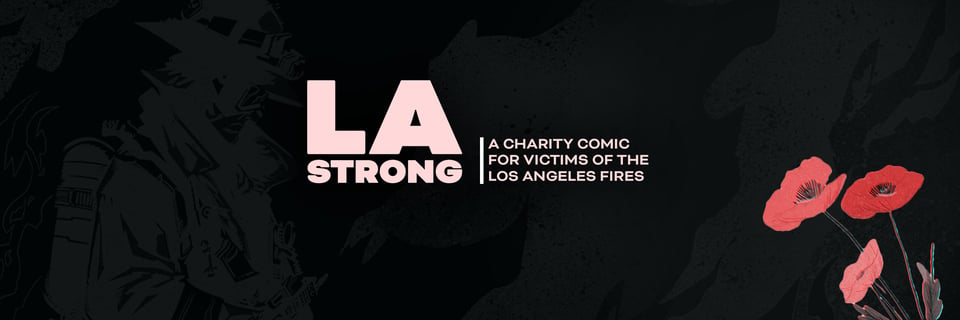
Not much in the way of promotion at the moment, as the next book—‘Project Mantle’—is currently in production and won’t be available until Fall 2025 (give or take.) Right now, we’ve finished the first issue, are drawing the second, and writing the fourth. As we get to the right moment, you’ll hear more about that book…but I will say, it’s definitely unlike any comic book I’ve ever written before. I’m having such a blast with it, and so is my co-author. The moment we can talk about it, the moment you will know.
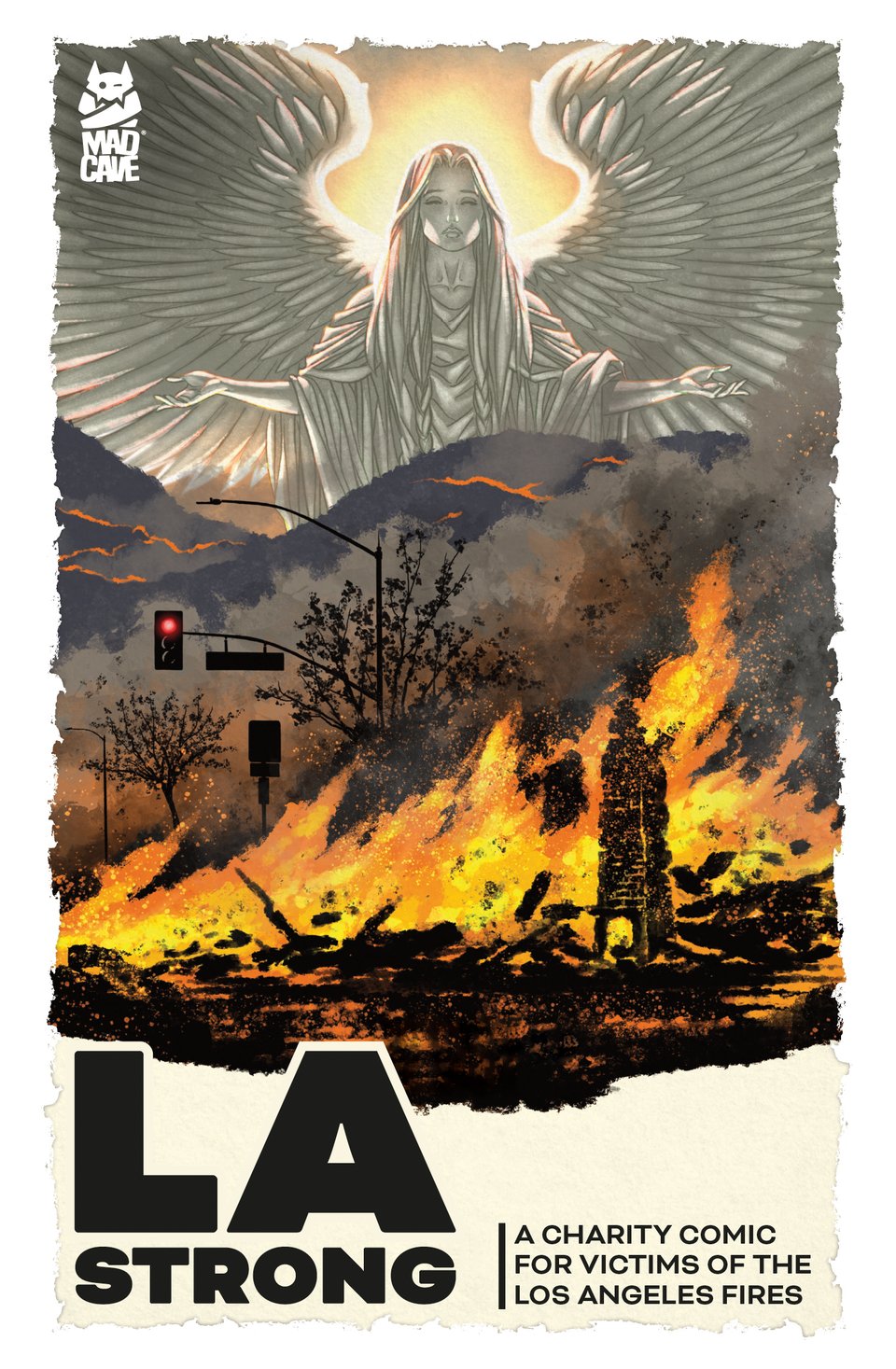
Meanwhile, I was honored and privileged to have my writing included in an upcoming important anthology, along with a star-studded list of comic book creators.
LA STRONG is a charity comic published by Mad Cave Studios, created to help support those comic book creators who lost their homes to the tragic Los Angeles wildfires. It features contributions from many amazing writers and artists, and all of the proceeds from the anthology will be donated for relief efforts.
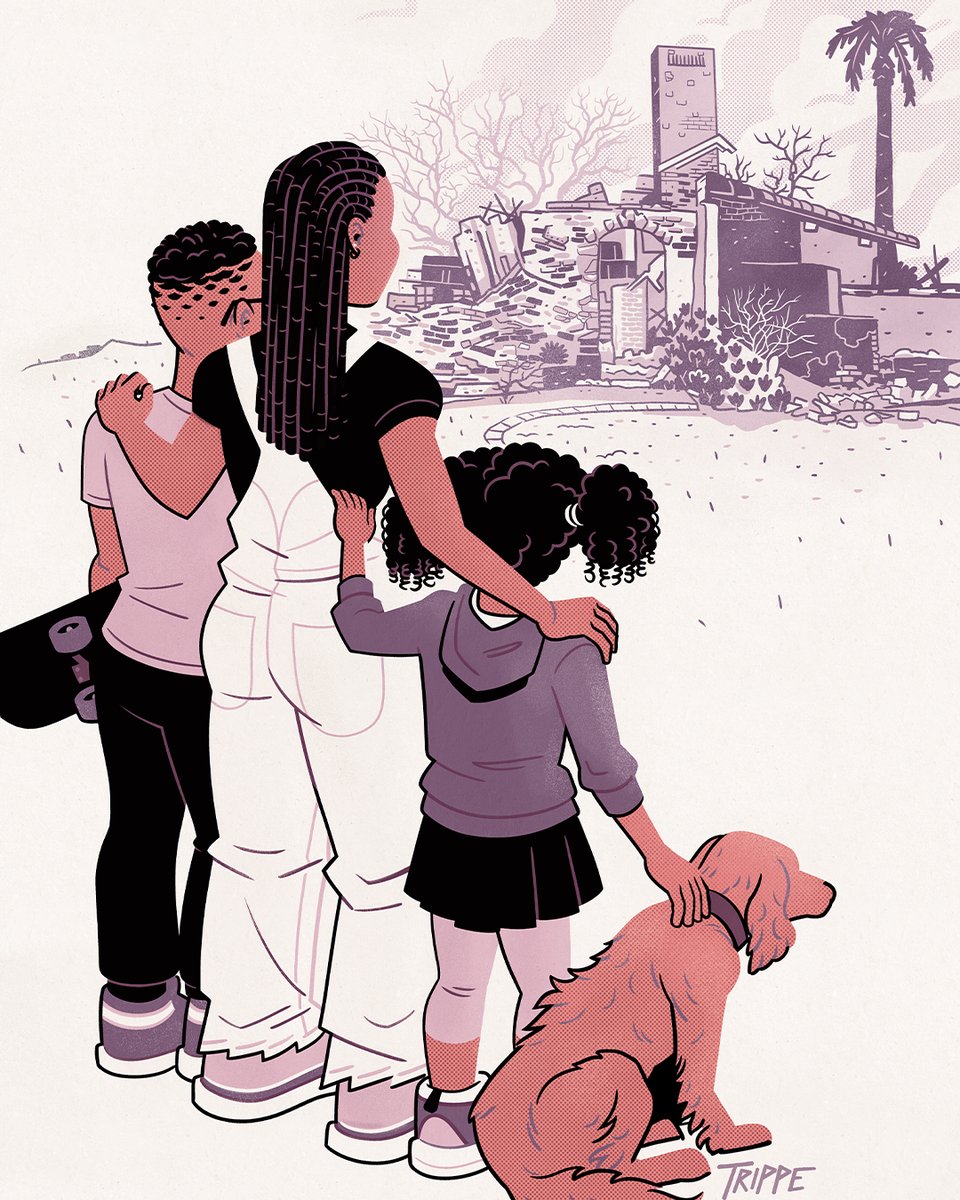
My piece, a short essay entitled “Irreplaceable”, accompanies a beautifully haunting piece of art by Mayday Trippe (seen above.) The book arrives March 19th in stores, and you still have time to preorder copies from your local shop using Lunar Code 1224MA843. If you are in Los Angeles, there will be a launch event for the book on March 22nd.
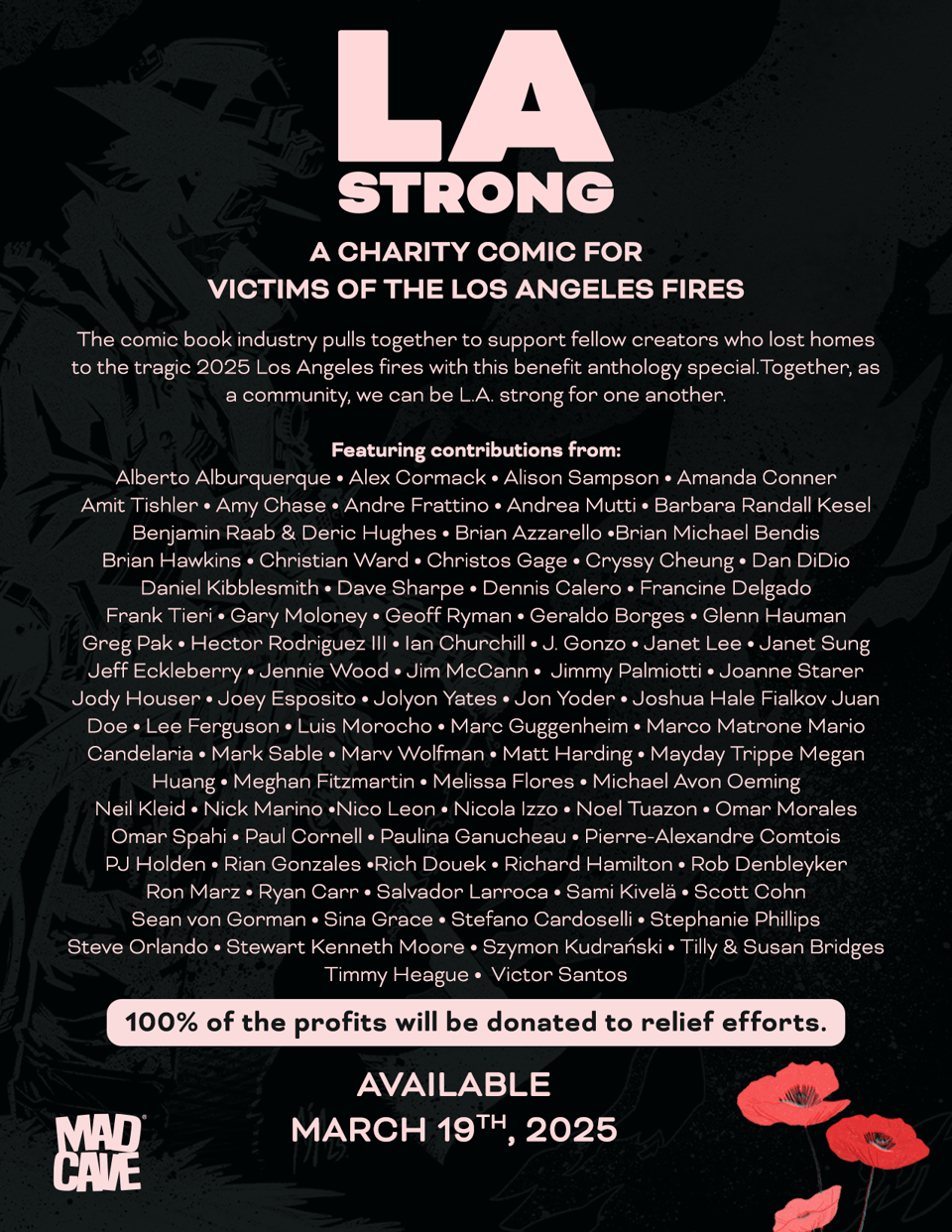
This is a very important book, and having seen the digital version, I can tell you it’s a gorgeous piece of work, one you’ll want to not only support, but own in your collection.
Thank you for checking it out, and helping to support those creators in need.
THE NASTY BITS
The Beat has an interesting article about this year’s ComicsPro industry summit, and the Diamond bankruptcy from a retailer’s POV. Worth checking out.
Speaking of Bourdain, his former assistant is putting out a book and revealing her life with him on the road. I’ll give it a read, but if you want a better Bourdain-connected memoir, I highly recommend Blood, Bones and Butter by Gabrielle Hamilton.
18f, the team that built the U.S. Web Design System and many other digital initiatives, was eliminated, in yet another bone-headed move by the bros currently tearing apart necessary government resources. Check out their letter responding to this turn of events. Then, if you’re on BlueSky, give them a follow.
‘The Great Comet of 2025’ won’t be seen again in the skies for hundreds of thousands of years. Have a look.
I’m excited to read We’re Taking Everyone Down With Us, by Matthew Rosenberg and Stefano Landini from Image Comics. I’m also looking forward to Assorted Crisis Events by Deniz Camp and Eric Zawadzki, also from Image. One of these days, I really would like to do a creator-owned series at Image Comics. Tell everyone that you know, especially if they work at Image Comics.
Did we ever discuss Bar Shiriqa Panda, the Jewish toilet demon? No? Here’s a link to a fun list by Arielle Kaplan which features a few more Jewish demons and supernatural creatures.
Elon Musk thinks all Jews with the same last name are related, apparently. Antisemites gonna antisemite, I suppose.
Do you know the history and controversy surrounding the Netflix “tudum” sound? Here’s a podcast about its creation. It was created by Lon Bender who recorded his wedding ring hitting a piece of furniture…but apparently there’s a rumor (possibly started by notorious truth-teller Kevin Spacey) that it was lifted from an episode of House of Cards, and fans online are pissed off that Netflix is attempting to retcon that “fact.”
Okay, yes. I am currently roasting bones for a homemade beef broth so I can make kosher pho. I’ve got 5 pounds of bones in the oven on 450 degrees for 30 minutes, and then I’ll stick it in my crockpot for 8 hours on low along with 14 cups of water, and:
2 yellow onions, halved and roasted
3 inches of ginger root
6 whole cloves
3 star anise pods
3 tablespoons of soy sauce, to replace the fish sauce / umami that is usually prevalent in this type of broth. You can’t mix fish sauce and beef for kosher dishes, because kosher law prohibits the eating of meat and fish at the same time. So it’s not exactly Vietnamese, but it will have to do. If you don’t keep kosher, use fish sauce here.
2 tablespoons of apple cider vinegar
2 tablespoons of brown sugar
1 cinnamon stick
1 tsp fennel seeds
1 tsp coriander seeds
1 tsp whole black peppercorn
Once that’s done, I’ll use the broth to make some spicy, delicious kosher pho. I’ll let you know how it all turns out. And yes, I’ll pour out a bowl for our late friend, Tony. I hope that he’d be proud.
Eat well my friends. Hope to see you back here in thirty.
—Neil